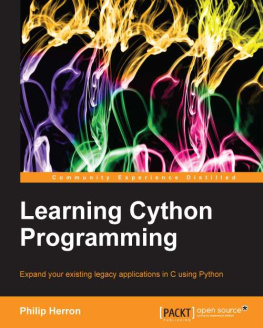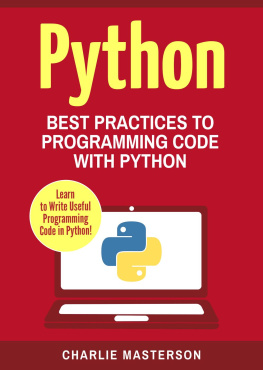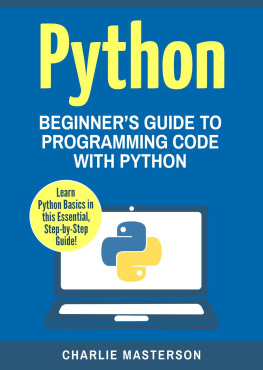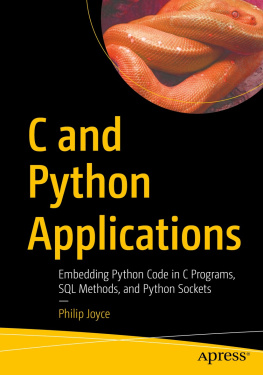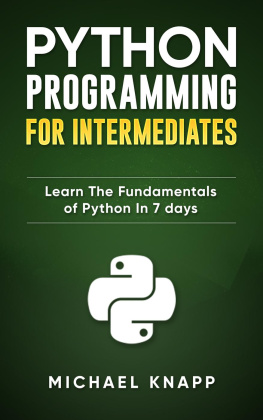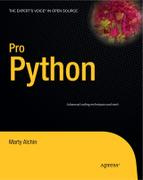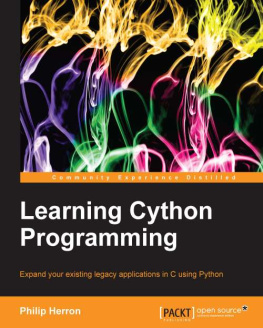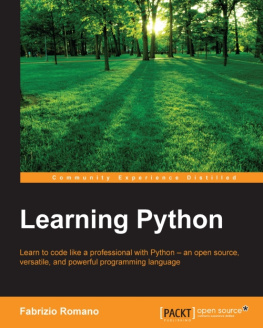Philip Herron - Learning Cython Programming
Here you can read online Philip Herron - Learning Cython Programming full text of the book (entire story) in english for free. Download pdf and epub, get meaning, cover and reviews about this ebook. year: 2013, publisher: Packt Publishing, genre: Home and family. Description of the work, (preface) as well as reviews are available. Best literature library LitArk.com created for fans of good reading and offers a wide selection of genres:
Romance novel
Science fiction
Adventure
Detective
Science
History
Home and family
Prose
Art
Politics
Computer
Non-fiction
Religion
Business
Children
Humor
Choose a favorite category and find really read worthwhile books. Enjoy immersion in the world of imagination, feel the emotions of the characters or learn something new for yourself, make an fascinating discovery.
- Book:Learning Cython Programming
- Author:
- Publisher:Packt Publishing
- Genre:
- Year:2013
- Rating:5 / 5
- Favourites:Add to favourites
- Your mark:
Learning Cython Programming: summary, description and annotation
We offer to read an annotation, description, summary or preface (depends on what the author of the book "Learning Cython Programming" wrote himself). If you haven't found the necessary information about the book — write in the comments, we will try to find it.
Expand your existing legacy applications in C using Python
Overview
- Extend C applications with pure Python code
- Expand low-level C open source projects with pure Python Tmux
- Get the most out of highly computational Python code using Cython
- Integrate your C applications with Python Distutils and Automake/Autoconf
In Detail
Cython is a very powerful combination of Python and C. Using Cython, you can write Python code that calls back and forth from and to C or C++ code natively at any point. It is a language with extra syntax allowing for optional static type declarations. It is also a very popular language as it can be used for multicore programming.
Learning Cython Programming will provide you with a detailed guide to extending your native applications in pure Python; imagine embedding a twisted web server into your native application with pure Python code. You will also learn how to get your new applications up and running by reusing Pythons extensive libraries such as Logging and Config Parser to name a few.
With Learning Cython Programming, you will learn that writing your own Python module in C from scratch is not only hard, but is also unsafe. Cython will automatically handle all type-conversion issues as well as garbage collection on your code. You can also still write all your code in Python but have it compiled and called directly in C as if it was just another function or data.
This book also demonstrates how you can take the open source project Tmux and extend it to add new commands directly in pure Python. With this book, you will learn everything you need to know to get up and running with Cython and how you can reuse examples in a practical way.
What you will learn from this book
- Reuse Python logging in C
- Make an IRC bot out of your C application
- Extend an application to have a web server for rest calls
- Use Cython against your C++ code
- Reuse Python ConfigParser in C
- Create Python bindings to native libraries
- Learn about threading and concurrency related to the GIL
- Expand Terminal Multiplexer Tmux with Cython
Approach
A practical and a fast-paced guide that gives you all the information you need to start programming using Cython.
Who this book is written for
This book is for developers who love C/C++ for low latency and speed but who also require the ability to add more dynamic features to applications both fast and reliably. It will also show you how you can get new applications off the ground by reusing Python libraries to get started.
Philip Herron: author's other books
Who wrote Learning Cython Programming? Find out the surname, the name of the author of the book and a list of all author's works by series.

